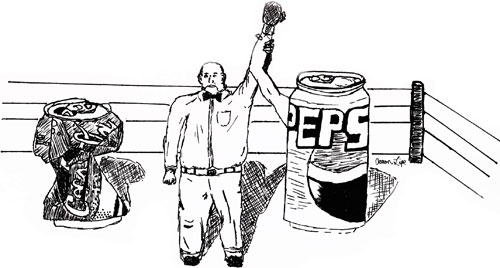A NEW ‘DEW

A NEW ‘DEW
Revenue from a new beverage distribution contract will be used to integrate a swipe card system at Missouri Southern.
A 10-year contract with Pepsi Bottling Group went into effect Aug. 1 and calls for an initial payment of $300,000 to the University. That money will be used to get the card system in place by fall 2009.
“For several years the campus has wanted to do what’s called a campus one-card system,” said Jeff Gibson, director of budget and operations.
“That means using an ID card in a sophisticated way to get library services, printing, food court, those types of things. We don’t presently have that capability, but we’re going to take the resources from the advance commissions from this contract and dedicate it to that project.”
The system will allow students to use the card at vending machines and laundry machines on campus, and will also be used to control access to the new student recreation center.
“I am really excited about the opportunity,” Gibson said. “I’ve had a passion to do that for about a decade. The need is huge, so I’m excited about that because it’s going to benefit students in a lot of different ways.
Pepsi replaces Coke as the new beverage distributor on campus. In addition to the initial $300,000, Pepsi will also pay $25,000 each year to a scholarship fund. After 34,000 cases of product have been sold, Pepsi will pay the University a 30 percent commission on all soft drinks and water sold, and 15 percent commission on all other products.
“The advance commissions were actually more with the Coke contract,” Gibson said. “I think $425,000. They are not putting out as much resources as they did 10 years ago. One of the more positive resources in the Pepsi contract is the $25,000 scholarship money we’ll get each year, so we’re excited about getting that. That wasn’t part of the Coke contract before.”
Gibson said Coke’s bid for the new contract wasn’t as extensive as it was 10 years ago, and was not comparative to Pepsi’s proposal.
“I don’t think they felt like the contract had been as lucrative as they hoped it would be,” he said. “They really didn’t step up to the plate as much this time.”
Allen Gardner, key accounts manager for Pepsi Bottling Group in Joplin, said just being associated with Southern benefits his company.
“With the number of students you have there are a lot of benefits to it,” Gardner said. “The fact that our name’s out there on your campus, and when students graduate college they have been drinking our products and will probably continue. Then the fact that some of the people at Southern might end up working for Pepsi.”
Gardner said Pepsi’s flavor lineup compared to Coke was beneficial to the University, especially because of Mountain Dew and Dr. Pepper, which he said are the top two single serves in the country.
Pepsi has 24 vending machines on campus, along with coolers in concessions areas and the coffee shop, and fountains in dining halls and the soon-to-be finished Lions’ Den. As for selling 34,000 cases, Gardner expects that number to be reached around year six of the contract or shortly after.
“We used to have MSSU over 10 years ago and we did 6,700 cases a year in full-service vending, albeit those were cans instead of bottles we have now,” Gardner said.
“The card system will help,” he added. “There will be a lot more sales going through when people don’t have to have cash on them.”
So far into the contract, Gardner said full-service vending is lower than expected, but sales in the coffee shop are making up for it.
“The vending machines are good, but they’re probably not going to do 4,000 cases a year or more until we get the card system instituted,” he said.
Gardner noted what he called an interesting statistic from when Pepsi lost the contract 10 years ago.
“You had 5,400 students,” he said, “and when we got it back you only had 5,500 students, so you only gained 100 students in 10 years. That was interesting, we figured it would be a lot more than that.”
Your donation will support the student journalists of Missouri Southern State University. Your contribution will allow us to purchase equipment and cover our annual website hosting costs.



























